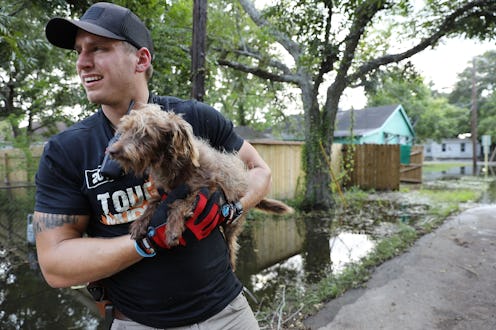News
How To Help Animal Shelters During Hurricane Florence And Make Sure Rescues Stay Safe

As millions of people evacuate their homes in the Southeast, you might be wondering how to help animal shelters during Hurricane Florence, too. The category 2 storm is expected to incur significant damage along the coastlines of North Carolina and South Carolina over the next week, and shelters are working around the clock to protect some of the area's most vulnerable inhabitants: animals.
While many families have been able to safely evacuate with their pets, other animals left behind in homes and shelters face a serious safety risk and possible resource shortage. “Our expenses for responding to Hurricanes Harvey, Irma and Maria were around $120,000 last year,” Joe Elmore, CEO of the Charleston Animal Society told Money magazine on Tuesday. “Five years ago we didn’t even budget for disasters.”
Local shelters have been working nonstop this week to get ahead of the storm by arranging evacuations and preparing disaster relief. Brother Wolf Animal Rescue in Asheville sent out teams to move adoptable animals to higher ground. The American Society for the Prevention of Cruelty to Animals (ASPCA) says it has a disaster response team on the ground and already arranged for boats, disaster-relief trailers, and other supplies to help in affected areas, according to the Asheville-Citizen Times.
If you would like to get involved with efforts to help animals in the path of the hurricane, here are a few ways to help:
Donate To A Local Shelter Or Humane Society
According to Elmore, the most effective way to help out is to donate money to local shelters working to house and rescue animals in the areas affected by the hurricane. He told Money that evacuating 265 animals ahead of Hurricane Irma in 2016 cost $60,000, of which $11,000 was for veterinary care alone. And right now, he says Charleston Animal Society is taking care of about 700 animals. Local organizations like Charleston Animal Society, Coastal Animal Rescue, Greenville Humane Society, The Humane Society of Charlotte, Pender County Animal Shelter, and Brother Wolf Animal Rescue are all great options for donation.
Donate Food For Dogs & Cats
As shelters fill up and the hurricane progresses, it will be harder for relief organizations to obtain pet supplies. Elmore told Money donations of dry food for dogs and cats and wet food for cats are always good options if you're looking to provide resources other than money.
Adopt Or Foster A Pet
The Washington Post reported on Wednesday that some shelters in North Carolina might be forced to euthanize animals if they run out of room to care for them. “We are avoiding euthanasia at all costs,” Jewel Horton, manager of the Pender County Animal Shelter, told the paper. “That’s why we’re begging for assistance.” If you live in the Southeast and are able to take in an animal, consider adopting or fostering a pet from a shelter in the area. Many shelters are also waiving adoption fees at this time.
Volunteer Your Time
Help shelters helping our four-legged friends by volunteering your time with local organizations, or national efforts with ASPCA. These operations use volunteer efforts to care for animals in the shelters, take in pets from evacuating residents, and rescue those found wandering the streets. Contact a local shelter or visit ASPCA's volunteer website to see how you can get involved.
Follow ASPCA Guidelines For Evacuation
For anyone with pets evacuating the coasts of North and South Carolinas, ASPCA urges you to follow a few guidelines — make sure your pets are microchipped and wearing a collar with identifying information, and keep an emergency kit with food, water, and any medication your pet requires. Importantly, anywhere that's unsafe for you is unsafe for your pet, so don't leave them behind!
Following these guidelines helps to prevent overcrowding in shelters, and ensures the safety of everyone's furry loved ones as Florence bears down along the coast. Every bit of preparation and support in the next few days will help shelters working to protect animals across the Southeast.